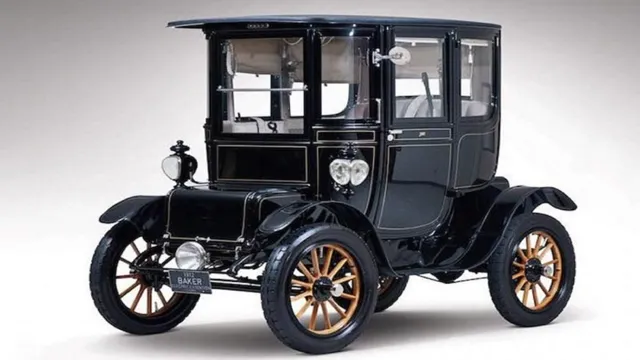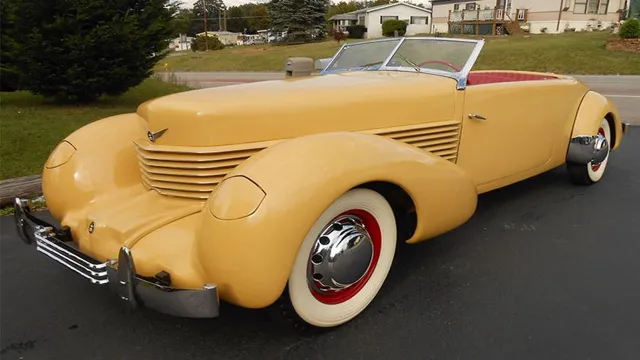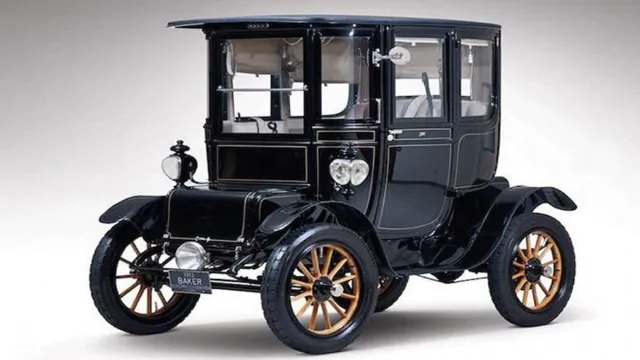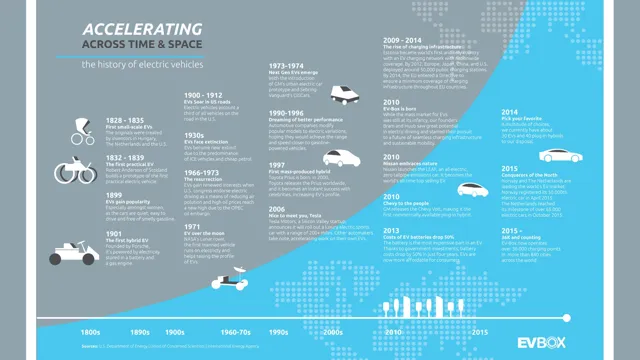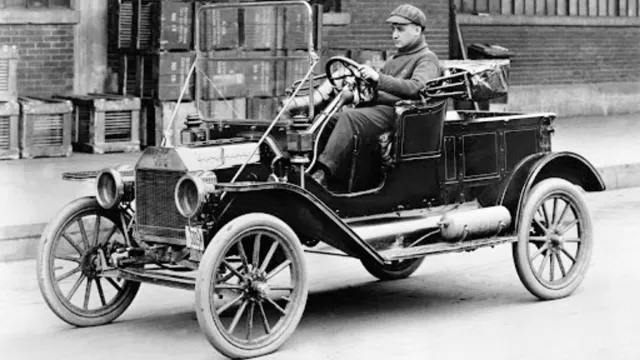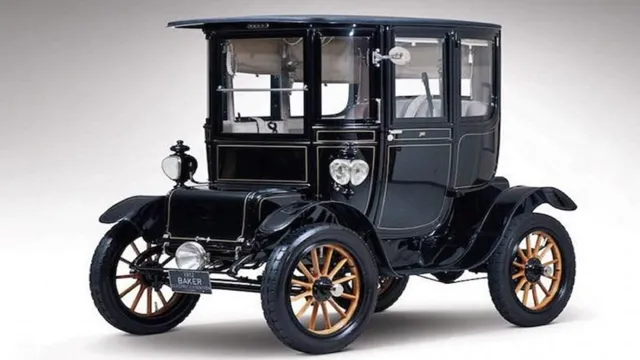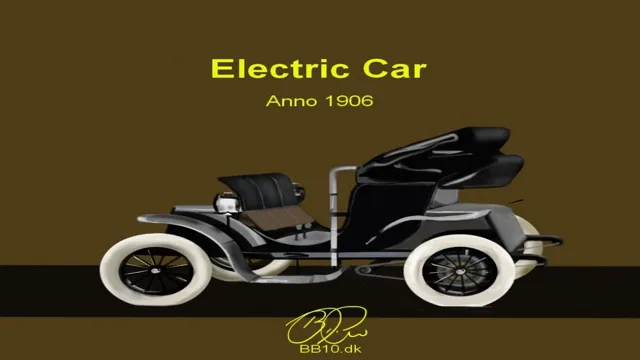Revolutionizing the Roads: A Look into the Fascinating History of Electric Cars in America
Electric cars have become increasingly popular in recent years, with more and more people opting for this alternative to traditional gasoline-powered vehicles. However, the history of electric cars in America dates back much further than one might think. In fact, electric cars were among the very first automobiles to hit the roads of America in the early 1900s.
This fascinating history is one that is often overlooked, but it is important to understand how electric cars have evolved over time and how they have become so popular today. From their humble beginnings to the modern-day electric car revolution, let’s delve into the exciting history of electric cars in America.
Early Electric Cars
The history of electric cars in America dates back to the early 1900s when they were first introduced to the market as an alternative to their gasoline counterparts. These electric vehicles were widely used by the wealthy and urban elites, as they provided a quiet, smooth and clean ride. However, their popularity waned as gasoline-powered cars became more affordable and readily available to the average person.
By the 1920s, electric cars had all but disappeared from the American market, only to make a comeback in recent years with the introduction of more advanced battery technology. Today, electric cars continue to grow in popularity and offer a more sustainable and environmentally friendly option for those looking to hit the road. The history of electric cars in America has come full circle, and it appears that they are here to stay.
Invention of the Electric Car
The early days of electric cars date back to the mid-19th century when inventors started experimenting with battery powered vehicles. One of the earliest electric cars was built by Scottish inventor Robert Anderson in 1832, powered by non-rechargeable cells. However, it wasn’t until the 1880s that electric cars began to gain popularity and become a viable alternative to gasoline-powered vehicles.
The first practical electric car was invented in 1884 by Thomas Parker, an English inventor who designed an electric vehicle that could run on rechargeable lead-acid batteries. By the 1890s, electric cars were the preferred choice for automobile enthusiasts in the US especially for women as they were easier to drive and maintain, and didn’t require messy refueling stops at gas stations. However, the invention of the electric starter motor by Charles Kettering in 1912 made gasoline-powered cars more convenient to operate, leading to a decline in popularity of electric cars until recent times when concerns about global warming and the need for cleaner transportation have revived interest in electric car technology.
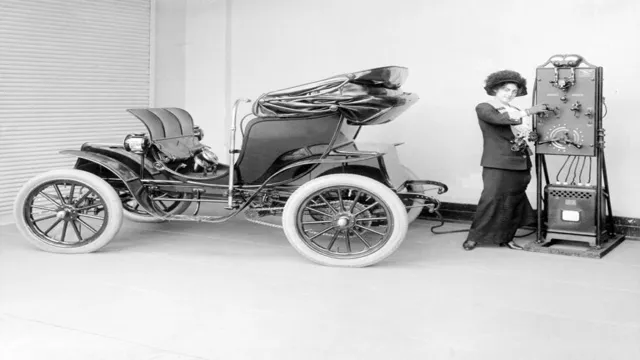
Advancements in Electric Car Technology
Early electric cars were quite primitive in comparison to the advanced models we see today. In the late 19th century, electric cars started gaining popularity as a viable alternative to gasoline-powered vehicles. However, the limited range of these early electric vehicles was a major drawback.
Batteries used in electric cars at that time were bulky and heavy, which resulted in a lower range. In addition, charging stations were not available, so owners had to rely on home charging. Over the years, advancements in electric car technology have revolutionized the industry.
Modern electric cars feature lightweight lithium-ion batteries that provide a longer range and faster charging times. Moreover, charging stations are now widely available, and some models can even use regenerative braking to recharge their batteries on the go. With more research and development, we can expect even more breakthroughs in electric car technology, making them a more accessible option for environmentally conscious consumers.
Gas vs Electric Cars
The history of electric cars in America is actually quite fascinating. Did you know that the first electric car appeared in the United States in the late 1800s? In fact, by the early 1900s, there were more electric cars on the road than gasoline-powered vehicles. However, as the demand for longer driving ranges and increased speed grew, gasoline-powered vehicles quickly became more popular.
It wasn’t until the 1990s that electric cars started to make a comeback. Today, thanks to advancements in technology and growing concerns over climate change, electric cars are once again gaining popularity. And while there are still challenges, like the need for more charging stations and the higher cost of some electric models, many experts believe that electric cars are the future of transportation.
With the history of electric cars in America, it’s exciting to see how far we have come and what the future may hold for this important technology.
Environmental Impact Comparisons
When it comes to choosing between gas and electric cars, one of the primary factors is the environmental impact. While both have their pros and cons, electric cars are often considered more environmentally friendly due to their lack of emissions. When driving an electric car, the only emissions are produced from the production of the electricity used to charge the vehicle.
On the other hand, gas cars emit pollutants such as carbon monoxide, nitrogen oxides, and volatile organic compounds, contributing to harmful air pollution and climate change. Additionally, the production process of gasoline itself is a major contributor to greenhouse gas emissions. So, while electric cars may have a higher upfront cost, they may ultimately be the more environmentally responsible choice in the long run.
Cost Comparisons
When it comes to buying a car, one of the most important factors to consider is the cost. And for cost-conscious consumers, the comparison between gas and electric cars is a popular topic. While gas-powered cars have been the norm for a long time, electric cars are becoming increasingly popular due to their fuel efficiency and eco-friendliness.
But are electric cars really the cheaper option in the long run? It depends on several factors such as the cost of electricity vs gas, the cost of maintenance and repairs, and the cost of the car itself. However, studies have shown that over time, electric cars can save you more money due to the low cost of electricity and less maintenance requirements. Plus, with the increasing availability of charging stations, the convenience of owning an electric car is constantly improving.
So, if you’re in the market for a new car, it may be worth considering an electric one for both financial and environmental reasons.
Performance Differences
Gas and electric cars have their own set of performance differences that make them unique in their own ways. Gas cars are known for their powerful engines, which can accelerate quickly and reach high speeds. This is due to their combustion engines and the fuel they use, which gives them an advantage in terms of horsepower.
On the other hand, electric cars are often praised for their superior handling and acceleration, thanks to their electric motors that can deliver torque instantly. They may not have the same amount of horsepower as gas cars, but they make up for it in their quick and responsive performance. Additionally, electric cars are known for their quiet and smooth operation, which provides a different driving experience than the familiar rumble of a gas engine.
Both gas and electric cars have their own pros and cons when it comes to performance, but ultimately, it comes down to personal preference and what you need from a vehicle.
Recent Developments
The history of electric cars in America has been long and varied, with many recent developments showing a renewed interest in this environmentally friendly mode of transportation. In the early 20th century, electric cars were actually more popular than gasoline-powered ones, but the invention of the electric starter motor for gas engines gave them an advantage. However, in recent years, concerns about climate change and rising fuel prices have led to a renewed interest in electric cars.
Major car manufacturers like Tesla, General Motors, and Ford are now producing electric cars with longer ranges and more features than ever before. Additionally, government incentives and tax credits have made electric cars more affordable for consumers. As a result, electric cars are becoming more and more common on American roads, and it looks like this trend will continue well into the future.
Tesla’s Impact on the Electric Car Industry
Tesla’s recent developments have had a significant impact on the electric car industry. The company has been leading the way in terms of innovation and technology, with its advancements in battery technology and self-driving capabilities. Tesla’s Model S Plaid, which was recently launched, boasts a range of over 390 miles and is capable of reaching 60 mph in under 2 seconds, making it the quickest production car on the market.
These developments are driving the shift towards electric vehicles, and many other manufacturers are scrambling to catch up with Tesla. With the increasing popularity of electric cars, the demand for charging infrastructure is also growing rapidly. Tesla’s Supercharger network, which currently has over 25,000 charging stalls across the world, is playing a crucial role in making electric cars more accessible and mainstream.
Overall, Tesla’s recent developments are revolutionizing the electric car market and accelerating the transition towards sustainable transportation.
Government Incentives for Electric Cars
Electric cars have been gaining more traction in recent years, and governments around the world are taking notice. In fact, many countries and cities have implemented various incentives to encourage people to make the switch to electric vehicles. Some of the most recent developments in this area include the United States’ push to expand the federal tax credit for electric vehicles, which would mean new incentives for buyers and manufacturers alike.
Additionally, in Europe, the European Parliament has set new emissions targets for automakers, which will lead to more electric cars on the road. Overall, these incentives and targets show that governments are taking the issue of reducing emissions seriously and are putting measures in place to make electric vehicles more accessible and appealing to consumers. If you’re considering purchasing an electric car, it’s worth looking into the various government incentives in your area, as they could help make the transition more affordable and manageable.
Future of Electric Cars
The history of electric cars in America can be traced all the way back to the early 1900s, when electric cars were just as prevalent, if not more so, than their gasoline-powered counterparts. However, due to a myriad of factors including lack of infrastructure, high production costs, and the discovery of large oil reserves, electric cars gradually lost popularity and were all but forgotten about until recent years. As we look towards the future of electric cars, it’s important to remember that they’ve been around for quite some time and that advancements in technology have made them more viable than ever before.
With ever-improving battery technology, longer driving range, and an increased number of charging stations, it’s clear that the future of electric cars is bright. And as we shift towards a more environmentally conscious society, it’s likely that more and more people will be turning to electric cars as a viable alternative to traditional gas-powered vehicles.
Upcoming Electric Car Models and Features
The future of electric cars is looking bright, with many exciting models and features on the horizon. One of the most anticipated releases is the Tesla Model Y, a compact SUV that is expected to hit the market in 2020. This electric vehicle features a range of up to 300 miles on a single charge, and it can go from 0 to 60 mph in just
5 seconds. Another highly anticipated model is the Ford Mustang Mach-E, an all-electric SUV that combines the iconic design of the Mustang with advanced electric technology. The Mach-E has a range of up to 300 miles and can be recharged in just 45 minutes.
In addition to these new models, electric cars are also set to feature new technologies such as bi-directional charging, which allows the car to act as a power source for the home or the grid. With all of these exciting developments in the world of electric cars, it’s clear that the future is electric.
Potential for Electric Cars to Replace Gas Cars
Electric Cars, Gas Cars, Future The future of electric cars looks promising as more and more people become environmentally conscious and seek methods to reduce their carbon footprints. While gas cars have been the norm for decades, electric vehicles are steadily gaining popularity. Electric cars can offer numerous benefits, including lower maintenance costs and zero emissions.
As technology advances, electric cars are becoming more efficient, offering longer driving ranges, and faster charging times. While some fear the range of electric vehicles, advancements in battery technology and infrastructure are quickly addressing these concerns. The potential for electric cars to replace gas cars looks likely, as governments worldwide begin to shift towards cleaner energy sources and create incentives for electric vehicle adoption.
As a result, manufacturers are also investing heavily in electric vehicle production, which is likely to result in more affordable electric cars in the future. With all these advances, it seems that the future may be electric after all.
Conclusion
In conclusion, the history of electric cars in America is a tale of great ideas, missed opportunities, and a growing awareness of the importance of sustainable transportation. From the early experiments of the 1800s to the recent resurgence in popularity, electric cars have come a long way. As we continue to address the challenges of climate change and the need for greater fuel efficiency, we can expect electric cars to play an increasingly important role in our transportation landscape.
So hop in, plug in, and enjoy the ride towards a brighter, cleaner future.”
FAQs
What was the first electric car introduced in America?
The first electric car introduced in America was the Morris and Salom Electrobat in 1891.
What led to the decline of electric cars in America in the early 20th century?
The discovery of oil in Texas and the resulting low gasoline prices led to the decline of electric cars in America in the early 20th century.
When was the resurgence of electric cars in America and what led to it?
The resurgence of electric cars in America began in the late 1990s and early 2000s, due to increased concern over pollution and the environment, as well as advances in battery technology.
What is the current state of the electric car market in America?
The electric car market in America is growing rapidly, with companies like Tesla, Chevrolet, and Nissan offering electric cars that are both high-performing and affordable. However, electric cars still only account for a small percentage of overall car sales in America.
